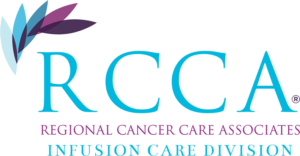Infusion Therapy Treatment for Rheumatoid Arthritis

At RCCA, we provide comprehensive care to patients with cancer and blood disorders, while also administering infusion therapy prescribed by other physicians for medical conditions like rheumatoid arthritis. Here, we describe infusion therapy treatment for rheumatoid arthritis, available at our twenty locations throughout New Jersey, Connecticut, Maryland, and the Washington, DC, area.
What Is Rheumatoid Arthritis?
Rheumatoid arthritis (RA) is a chronic autoimmune disease that causes the body’s immune system to attack its own healthy cells. With RA, the immune system attacks the lining of the joints, causing inflammation, pain, and stiffness. Rheumatoid arthritis usually affects more than one joint and is most common in the hands, wrists, knees, and ankles. It can occur in other joints, as well. The severity of each patient’s symptoms depends on the degree of inflammation in their joints and surrounding bones, tendons, and ligaments.
Many people with rheumatoid arthritis can experience periods of increased symptoms, known as flares, followed by periods of decreased symptoms, known as remission. Common RA symptoms include:
- Pain or aching in more than one joint
- Stiffness in more than one joint
- Tenderness and swelling in more than one joint
- Fatigue
- Fever
- Loss of appetite
- Weakness
- Weight loss
If you experience any of these symptoms regularly, it is important to talk to your primary care provider. If RA is suspected or confirmed, patients are often referred to a rheumatologist, a doctor who specializes in arthritis.
RA Risk Factors
Rheumatoid arthritis is caused by a faulty immune response. While researchers continue to investigate the specific mechanisms underlying the autoimmune disorder, they have identified several risk factors that can increase a patient’s risk of developing RA. Those risk factors include:
- Age: The chances of developing RA increase with age, although it can occur at any age. The Centers for Disease Control and Prevention (CDC) states that the onset of RA is highest among adults in their sixties.
- Gender: Women have a two-to-three times higher chance of developing RA than men.
- Genetics: People born with specific genetic traits, such as human leukocyte antigen (HLA) class II genotypes, are at elevated risk for developing RA.
- Smoking: Multiple studies have shown that smoking cigarettes increases a person’s risk of developing RA and can make the disease worse.
- Obesity: Being obese can increase the risk of developing RA.
If you have one or more of these risk factors, it does not mean you will develop rheumatoid arthritis, but the factors can increase your chances of being diagnosed with RA.
RA Diagnosis
Rheumatoid arthritis is typically diagnosed by a primary care doctor or a rheumatologist. However, it can be difficult to diagnose RA because symptoms may not be present in the early stages, there is no single test for the disease, and symptoms vary between patients. Therefore, doctors use a few different methods to diagnose RA and rule out other conditions. These include:
- Reviewing symptoms and medical history
- Conducting a physical exam
- Obtaining X-rays, MRIs, or other imaging
- Running blood work or lab tests, like rheumatoid factor (RF), anti-cyclic citrullinated peptide antibody (anti-CCP), erythrocyte sedimentation rate, and more
If the results of these evaluations point to RA, a patient will be diagnosed with the condition. Experts recommend diagnosing RA as early as possible, typically within six months of the onset of symptoms. This is so patients can begin treatment promptly, slow disease progression, and reduce the harmful effects of RA before it damages the joints.
Rheumatoid Arthritis Treatments
There is no cure for rheumatoid arthritis, but it can be managed effectively with various treatments. Treatment plans will vary based on the nature and severity of a patient’s RA, as well as the patient’s age, overall health, and other medical conditions, but may include:
- Medication: Anti-inflammatory drugs and corticosteroids can help decrease pain and swelling, while other medications, such as disease-modifying antirheumatic drugs (DMARDs) and biological response modifiers (biologicals) help slow progression and prevent joint deformity.
- Physical therapy: Physical therapy can help build muscle around the affected joints and improve their range of motion, decreasing stiffness and pain.
- Surgery: Joint replacement or joint fusion surgeries are often used in cases of advanced RA with joint deformity.
Making lifestyle changes such as quitting smoking, losing weight, and exercising regularly also can help ease the symptoms of RA. Your medical team will work with you to determine the best treatment option for your rheumatoid arthritis.
Infusion Therapy for Rheumatoid Arthritis
Although many RA medications are taken orally, others involve infusion therapy, meaning thst the medicine is administered to patients intravenously.
For patients with advanced cases of RA, infusion therapy can be used to administer biological medications after oral medications have not worked. Infusions can be prescribed alone or along with oral drugs. Your rheumatologist or other physician will work with you to determine the best option for you. Infusion medicines can be expensive, but most insurance plans provide coverage for at least one of the RA infusion drugs. Many health plans now require biosimilar medications to be used for infusion therapy. These drugs have the same or similar molecular structure and effects as the original medication but at a lower cost.
Benefits of Infusion Therapy for RA
For many patients with advanced rheumatoid arthritis or RA that has not responded to other treatments, infusion therapy is the next option. This type of treatment offers several benefits to RA patients, including:
- Faster response time, because infusions are absorbed faster than oral medications
- Increased precision, because infusions are administered in a medical setting and patients are monitored throughout
- An alternative to oral medication, which is important because some patients may not be able to swallow properly
- No or minimal pain, with patients usually only feeling a slight pinch when the needle is inserted
Although infusion of biological medications is beneficial for many RA patients, these medications may decrease your immune system’s ability to fight infection. They also can cause fatigue, infections, or other side effects. Make sure to discuss with your medical team the pros and cons of infusion therapy for your rheumatoid arthritis.
Frequently Asked Questions About RA Infusion Therapy
What can I expect from an infusion?
When you go to your infusion appointments, your vital signs will be checked and you will be weighed, because infusion dosages are calculated by body weight. You will then have an IV placed into your arm or hand and the correct dosage of your biological medicine will be administered. It can take as little as thirty minutes or as long as four hours. The medical staff will monitor you throughout the treatment to watch for any adverse reactions.
How should I prepare for my infusion appointments?
Because infusion sessions can vary in length, you want to come prepared for your appointment with things that can make you feel relaxed. RCCA’s infusion centershave comfortable chairs to sit on, but you can bring along a pillow or blanket to make yourself feel at home. Some patients also like to bring water, snacks, books, a tablet or laptop, or phone chargers.
What are biosimilar medications?
Biosimilar medications are medicines that are similar to biologics manufactured by a different company. They are essentially the same medication, with a highly comparable structure and activity as the brand name biologic. This means they are as safe and effective as the biologic, but they can be less expensive than brand-name biologics. Biosimilar medications have to be approved by the Food and Drug Administration (FDA), with approval granted only after a rigorous review process. Many insurance plans require the use of biosimilar medications over biologics.
Infusion Therapy at Regional Cancer Care Associates
Regional Cancer Care Associates is proud to offer infusion therapy for RA and many other conditions at its 20 conveniently located care centers throughout New Jersey, Connecticut, Maryland, and the Washington, DC, area. We are dedicated to providing patients with rheumatoid arthritis, cancer, and other medical conditions access to the infusions they need, close to home. At RCCA’s infusion centers, our experienced doctors and staff:
- Work with patients’ referring physicians to coordinate care
- Administer infusions with specific protocols for each drug, reducing the chances of adverse side effects and enhancing outcomes
- Explain the infusion therapy process to each patient, answer any questions, and monitor patients throughout treatment
- Provide a calm and welcoming atmosphere
- Offer treatment counseling and education
- Accept most insuranceplans
- Provide financial advocacy and financial counseling services
Another benefit to receiving infusions through a community-based clinic like those of Regional Cancer Care Associates is that the treatments can be substantially less expensive than they are when administered at a hospital. If infusion therapy sounds promising for your rheumatoid arthritis, ask your rheumatologist or other doctor for more information today.
Schedule a Consultation with RCCA
If you are dealing with rheumatoid arthritis pain, don’t continue with a treatment regimen that isn’t working. Ask your rheumatologist about infusion therapy, a promising treatment for rheumatoid arthritis that can be effective for patients who have not experienced relief from other therapies.
At Regional Cancer Care Associates, we offer comprehensive and compassionate medical care at more than twenty locations throughout New Jersey, Connecticut, Maryland, and the Washington, DC, area. Contact us today to learn more about infusion therapy for RA or to schedule an appointment.
